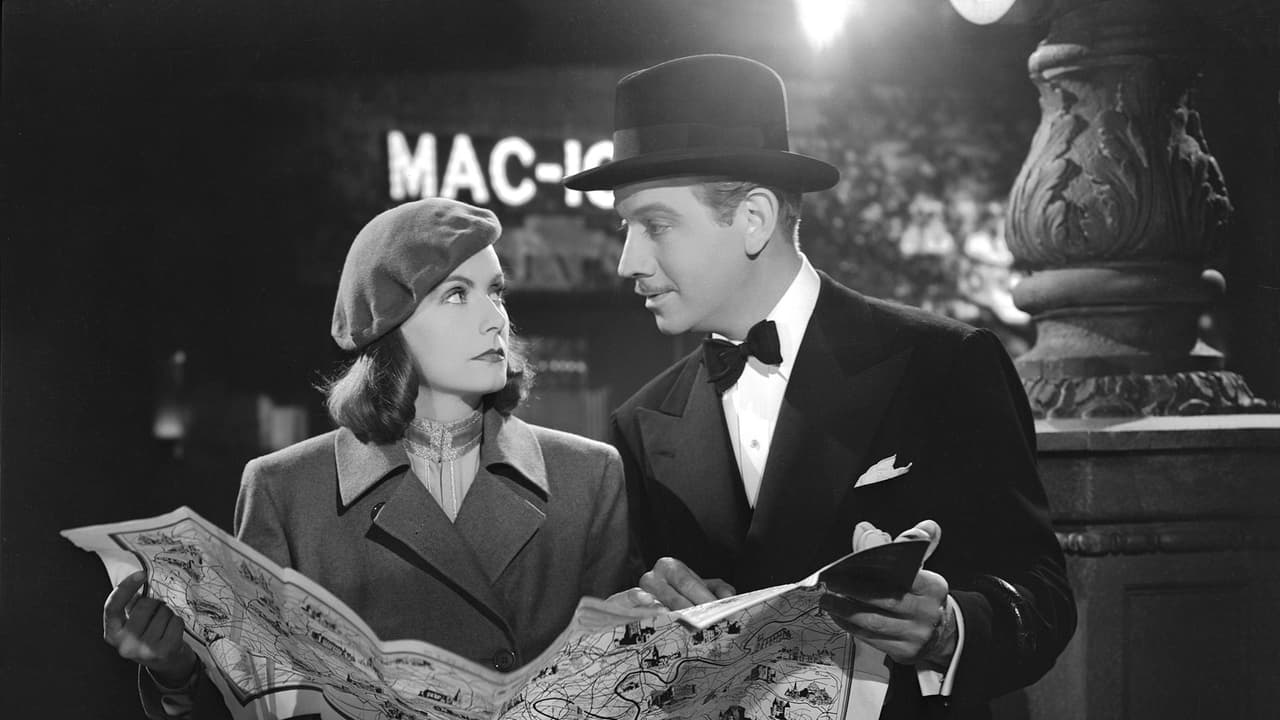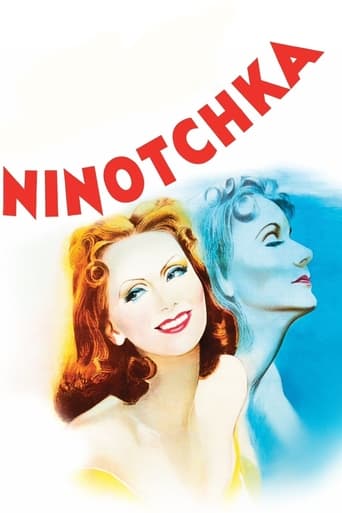

Ninotchka is one of my all time favorite films because it is such a clever, witty study in contrasts. .the stern, humorless "Soviet lady" sent to worldly Paris to reclaim property, and the dashing, worldly "Count Leon" (Melvyn Douglas) who is out to thwart her plans. Little does he know what's in store! Ninotchka's grim determination to accomplish her mission...and Leon's dogged determination to charm her away from her goal, is a delight to watch. And added in the mix are the three Russian comrades - well meaning but soon overcome by the delights of "ringing three times" for the cigarette girls..not to mention the former and entitled Grand Duchess Swana (played with regal hauteur by Ina Claire) who's determined that she'll keep her precious jewels and Leon too.. and send the Soviet envoy packing back to Russia. Who would have thought that Melvyn Douglas could be a romantic and Greta Garbo a comedienne. Ernst Lubitsch certainly concocted a merry confection and it is reported that even Miss Garbo enjoyed working on the film. I just wonder how Ninotchka went over with the production code. Ninotchka and her associates are true Soviet believers, and the exiled Grand Duchess Swana is somebody you would just love to see a meteorite fall upon. Of course the film does make references to the Russian shortages, marching, and spies planted among the Russian everyman, but it does so in a comical way. For sure Lubitsch could not have made this film in the atmosphere of ten years later because of all of the Communist paranoia in the United States. A little odd factoid - Ina Claire and Greta Garbo actually had something in common in real life - John Gilbert. Gilbert married Claire in 1929 after he and Garbo were done romantically. They divorced in 1931.
... View MoreAt the core of this film is a dispute between the French and the Russians over which nationality a certain set of rich jewelry belongs to. Three Russians have obtained the jewels (legally from what I understood) although technically they had belonged to a powerful individual from France. The leading actor plays a Frenchman who is trying to make a compromise for both sides, but the three Russians want a consultant for themselves, so they hire the titular Ninotchka, a Russian woman devoid of all joy and happiness.The Frenchman meets this woman before finding out she is the consultant for the Russians, and as if it was fate, he falls for her. He is persistent to spend time with her, and even realizes she does not enjoy life as she should, so he attempts to make her laugh, but there is no success until he does something unintentionally - he falls over a table in a restaurant and it makes everybody, including Ninotchka, to laugh themselves silly.After this incident, things seem to change for Ninotchka, and she even laughs during very serious matters such as while she consults the three Russians about the dispute at hand. She truly enjoys life now and she comes to like the man, Leon, a lot, and eventually falls in love. This doesn't come about without some struggles, of course, but the heart of the movie effectively tells us that life is definitely worth enjoying.This being a comedy, I wish there was more and better humor involved, but this movie is delightful in that its message is inspiring and still does fine without "better" comedy.3.0/4.0
... View More"Ninotschka" is not only a typical Lubitsch-style romantic comedy, it is a satirical political movie. Greta Garbo excels in her performance as a Soviet-drilled inspector who undergoes her own transformation the longer she stays in Paris and the more she begins to have romantic feelings for the Count d'Algout. All characters have been finely developed and watching this black and white film becomes a nice afternoon or evening entertainment. Apart from this, we get a nice scenic impression of Paris in contrast to what the East, Moscow, was imagined at that time. With "Ninotschka", Ernst Lubitsch has created a very entertaining and funny love comedy which is certainly a must-see for all Garbo fans!
... View More"Ninotchka" is one of the funniest movies ever made. But it's not a slapstick or screwball comedy. It is in the class of "It Happened One Night," "My Man Godfry," and "Holiday." The humor is in snappy dialog. The one-liners, subtle zingers, and satire poke fun mostly at Soviet Russia and communism. But it has occasional jabs at capitalism and western lifestyles – notably the idle rich. The movie is superb in all aspects, especially in the script, direction, settings and acting. All of the cast give top performances. Greta Garbo and Melvyn Douglas are the perfect match for some of the funniest repartee ever put on film. But, how Garbo (Ninotchka) could keep a straight face in those exchanges, one after another, is beyond me. I'll bet MGM had to do many retakes of some of her scenes. If not for her breaking down, then for the cracking up of Douglas (Leon) or others on the set and behind the camera. "Ninotchka" is one of the great comedy-romances for the ages. Young and old alike can enjoy it. But, from some of the comments I've read, it seems much of the humor is lost without a little knowledge of the time. So, I offer these tidbits to help set the stage and prepare viewers for a most enjoyable film. The time is the late 1930s. The story takes place mostly in Paris, moves to Moscow later, and ends in Istanbul. In 1939, all the world knows about Soviet Russia and many of its problems. It has been in the news since the communist takeover after the revolutions 20 years earlier. Joseph Stalin's five-year plan for recovery since 1922 was past its 15th year. So far, it had been an abysmal failure. His social programs had disrupted total populations. His collectivist farm program had failed miserably. Combined with drought and famine, the Russian people faced starvation.But that's not all. The Great Purge of 1936-38 had been in the news the past couple of years. It was Stalin's way to get rid of anyone who didn't agree with him or who might challenge his oppressive rule of Russia. The purge eradicated half a million Russian leaders. The press had covered the carefully staged mock trials in Moscow in that time. Many Russian communist and social leaders confessed to being traitors before they were sentenced to death or the gulags in Siberia. As all of that was going on and being reported from Russia, a number of former Czarist Russian royalty were living in exile around Europe, especially in Paris. Many stories and jokes circulated at that time about crown jewels and lost titles. Thus, the stage is set for "Ninotchka." With the large number of reviews posted up to this time, I wouldn't normally add my own. But, I think far too many people have missed the true depth of the satire and comedy in this great film. The IMDb Web site has a long list of witty dialog and exchanges from the film. But there are many more – and some real subtle zingers that I think many people miss. Here are a few to whet your appetite. In an early scene, Ninotchka explains why Soviet Russia is "peddling our precious possessions to the world at this time." She says, "Our next year's crop is in danger, and you know it. Unless we can get foreign currency to buy tractors, there'll not be enough bread for our people and you comrades." What a great example of skewered Soviet thinking. As if tractors could overcome a drought and famine. It's a great jab at the Soviets.Here's another one. Garbo looks over her hotel suite and says, "I'm ashamed to put a picture of Lenin in a room like this." And another, when her cohorts take her to the suite they reserved for her. "Which part of the room is mine?" Garbo asks. And a cohort replies, "You see, comrade, it's a little different here. They don't rent rooms in pieces. We had to take the whole suite." One more side-splitter was when her agents asked, "How are things in Moscow?" Garbo replied, "Very good. The last mass trial was a great success. There are going to be fewer but better Russians." A direct jab at Stalin's Great Purge. Douglas, meeting with the three agents early in the film, says that the jewels owned by the exiled duchess were confiscated by the Soviets. One of the agents quips, "I give you my word, they were confiscated legally." In a café later, a waiter seats Ninotchka and asks, "Now what shall it be?" She says, "Raw beets and carrots." He replies, "Madame, this is a restaurant, not a meadow." She next says, "Bring me something simple – I never think about food." The waiter asks, "If you don't think about food, what do you think about?" Ninotchka answers, "The future of the common people." And the waiter replies, "That's also a question of food." What a great running dialog!"Ninotchka" was nominated for four Academy Awards, including Garbo for best actress and the film as best picture. That year may have been the best year in motion picture history for the number of great films produced. But for that, "Ninotchka" likely would have won two or more Oscars. More than 40 full length movies competed for 1939 Oscar honors. Among the best of the year were "Gone With the Wind," "Stagecoach," Goodbye, Mr. Chips," "Mr. Smith Goes to Washington," "The Wizard of Oz," "Ninotchka," "Wuthering Heights," "Dark Victory," "Beau Geste," "Of Mice and Men," "Young Mr. Lincoln," "Gunga Din," "The Four Feathers," "Only Angels Have Wings," and "Bachelor Mother." Those top 15 films have a combined average viewer rating (on September 20, 2012) of 7.8. Has there been another year of more great movies than that?
... View More